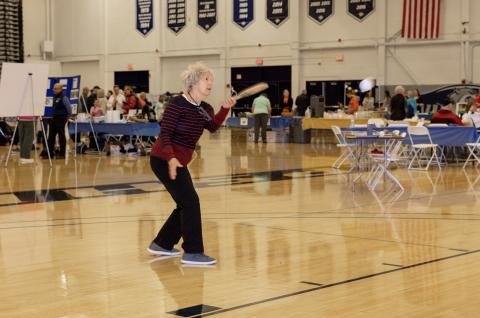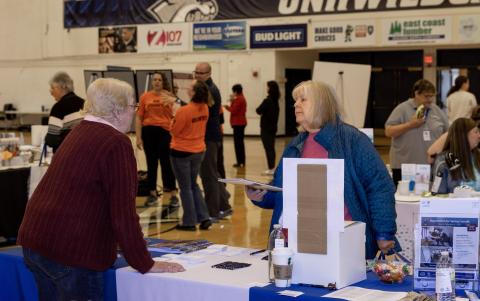It’s Never Too Soon to Age Well": UNH’s Age of Champions Event Celebrates Healthy Living

It can be easy to fixate on the negative aspects of aging, but with a bit of education and the right resources, aging can be a healthy, empowering process.
For over a decade, the Age of Champions Health & Wellness Fair, hosted by the Center on Aging and Community Living (CACL) and UNH, has promoted this message—challenging perceptions of aging while bringing together students, older adults, and community organizations in a celebration of wellness across generations.
This year’s event is April 26 at the Hamel Recreation Center.
From Documentary to Community Event
The Age of Champions name comes from a documentary highlighting older adults competing in the Senior Olympics.
“One of our professors in Recreation Management and Policy thought, 'this is really cool; maybe we should view the documentary and have a panel of older adults talk to students about what it means to be active, what healthy aging looks like,’” says Laura Davie, co-director of CACL.
After a few years, the screening and panel evolved into a full-fledged community fair with multiple goals: to educate students, connect older adults with resources, and promote active lifestyles.
"Now we have over 50 community vendors, seven or eight academic departments and 11 student groups participating, and demonstrations happening throughout the day. Throughout the event, we might have as many as 300 participants coming in,” says Jennifer Rabalais, co-director of CACL.
Connecting Generations Through Wellness and Learning

Community vendors at the event include recreation programs, assisted living facilities, assistive technology providers, and emergency services. Student-led tables offer assessments and information based on their academic focuses, including occupational therapy students providing education and screenings on falls prevention.
"You can get an assessment or information from our students, and then learn where all the walkable trails are in the area, what's happening at your local Y, or where you can get information on better telephone systems if you have difficulty hearing," Davie says.
Students also lead hands-on demonstrations—past examples include pickleball, cardio drumming, Tai Chi, and music and memory activities.
The Active Retirement Association, a UNH outreach program that provides educational and cultural programming, has been a longtime partner and vendor at the event. Association President Bill DeVries says the event is widely promoted within the group and is popular based on member feedback and participation.
"It draws a lot of social service agencies and organizations that try to coordinate different programs,” DeVries says. “It would take a fair amount of investigation to find out what's available near you, but these agencies all show up for Age of Champions. You can use it to find out what might help you achieve the life you want."
Expanding the Meaning of Healthy Aging
This year's event will feature new intergenerational activities, including participation from the Child Study and Development Center, which will set up an intergenerational maze. Another new addition will involve music requests from the 30s and 40s, allowing participants to share memories associated with these tunes.
"We're focusing more and more on the aspect that this is an intergenerational event," says Rabalais. "We're encouraging people to come as a family and bring their kids and grandkids. We're all aging, just at different stages, and the topic of aging is important for all of us."
Another benefit of the event is that it can change student perceptions and career trajectories, according to Davie. Many students provided feedback that they never considered working with older adults until their participation in Age of Champions gave them a positive experience.
"The benefits are bidirectional," Davie says. "The intent is not just for older adults and families to participate in demonstrations, but it also exposes students—some for the very first time—to working with older adults."
DeVries says the event’s slogan, “It’s never too soon to age well,” is especially appropriate.
“I think people in their 30s or 40s should start thinking about it—much like how we’re encouraged to think about retirement planning early on,” DeVries says. “If you’re blissfully unaware and not thinking about retirement in your 20s and 30s, by the time you hit 50, it’s not necessarily too late—but it is a lot harder. I think aging well follows the same idea.”
